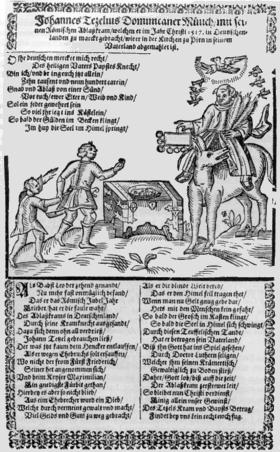|
Als Babst Leo der zehend genandt/
Nu mehr fast onmüglich befand/
das er das Römisch JubelJahr/
Erlebet/ hat er die faule wahr/
des Ablaßkrams in Deutschenland/
Durch seine Kramknecht ausgesandt/
Dazu sich denn ohn all verdrieß/
Johann Tetzel gebrauchen ließ/
Der was itzt kaum dem Henker entlauffen/
als er wegen Ehebruchs solt ersauffen/
Wo nicht der from Fürst Friederich/
Seiner hat angenommen sich/
Und beim Kaiser Maximilian/
ein gnedigste Fürbit gethan/
Hierbey es aber so nicht blieb/
Aus eim Ehebrecher wurd ein Dieb/
Welchr durch vermeint gewalt und macht/
Viel Gelds und Guts zu weg gebracht/
Als er die blinde Welt bered/
Das er den Himel feil tragen thet/
Wenn man nu Gelt gnug gebe dar/
Hets mit den Menschen kein gefahr/
So bald der Grosch im Kasten klingt/
So bald die Seel in Himel sich schwingt/
Durch diesen Teufflischen Tandt/
Hat er betrogen sein Vaterland/
Biß ihn Gott hat ins Spiel gesehen/
Durch Doctor Luthern seligen/
Welcher ihm seinen Krämertisch/
Gewaltiglich zu Boden stieß/
Daher/ Gott lob/ biß auff die zeit/
Der Ablaßkram zerstrewer leit/
So bleibet nun Christi verdienst/
Einig allein unser Gewinst/
Des Tezels Kram und Babsts Betrug/
Findet bey uns kein recht noch fug.
|
When Pope Leo, called the tenth,
found it nearly impossible
that he might witness the Roman
year of celebration, he sent his merchant servants
with the rotten ware
of indulgence stuff into the German lands.
And Johann Tetzel did not shrink
from being used for this.
He had just escaped the hangman
who would have drowned him for adultery
if the pius count Frederic
had not taken him to his heart
and pleaded with Emperor Maximilian
on his behalf at length.
This, however, was not the end of the matter:
An adulterer turned into a thief,
who, through supposed force and might,
came to much money and goods
as he makes the blind world believe
that he has heaven on offer.
If only one gives enough money
all danger for men disappears.
As soon as the groschen's sound in the box is heard
the soul leaps up to heaven.
Through this devellish knick-knack
he betrayed his fatherland
til God looked him into his game
through the late Doctor Luther,
who threw his merchandise
to the ground with all his might.
Thus, thanks to God, in our time
the indulgence stuff is scattered far and wide,
and the achievement of Christ is
solely to our advantage.
Tetzel's stuff and the Pope's fraud
are not accepted as right and justice where we live.
|

